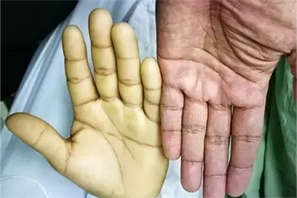Best Doctor for Anemia Treatment in Ahmedabad
Dr. Aishwarya Raj is renowned as the premier doctor for Anemia, offering unparalleled expertise and compassionate care. With a deep understanding of the condition and a patient-centric approach, She delivers the best-in-class treatment, empowering patients to lead healthy and fulfilling lives.
- 25 years of experience in Anemia treatment.
- A Complete Diet Suggestion according to sugar level
- Talk to Our Expert for free
Book Appointment
Anemia Treatment in Ahmedabad
Anemia, also spelled as "anemia," is a medical condition characterized by a decrease in the number of red blood cells (RBCs) or a decrease in the amount of hemoglobin in the blood. Hemoglobin is the protein in red blood cells that carries oxygen to the body's tissues.
Diagnosis of anemia involves a physical examination, medical history assessment, blood tests (such as CBC, iron studies, vitamin B12 and folate levels), and sometimes additional investigations based on the suspected cause.
Treatment of anemia depends on the underlying cause and may involve addressing nutritional deficiencies, treating underlying diseases, managing blood loss, providing blood transfusions, or prescribing medications such as iron supplements or vitamin B12 injections.
- Fatigue and weakness
- Pale skin
- Shortness of breath
- Rapid or irregular heartbeat
- Dizziness or lightheadedness
- Cold hands and feet
- Headaches
- Weakness and lack of concentration
Causes of Anemia :
- Iron deficiency anemia
- Vitamin deficiency anemias
- Chronic diseases
- Hemolytic anemias
Diagnosis Test :
- Medical history and physical examination
- Blood tests
- Peripheral blood smear
- Further tests
Treatment
- Taking insulinIron supplementation
- Vitamin supplementation
- Blood transfusions
- Treatment of underlying conditions
- Erythropoietin-stimulating agents (ESA)
Best Doctor For Anemia Treatment

Dr. Aishwarya Raj, the best and renowned endocrinologist at Aaryaa Endocrine Clinic, is widely regarded as the best doctor for anemia treatment. With an impressive track record of delivering exceptional patient care, Dr. Raj has established herself as a trusted expert in the field.
With years of experience and extensive knowledge in anemia, Dr. Raj offers comprehensive and personalized treatment plans for patients. She understands the complexities of anemia and recognizes the importance of tailoring treatment to meet the unique needs of each individual.
Dr. Raj stays up-to-date with the latest advancements in anemia research and treatment modalities. Her approach combines evidence-based practices with compassionate care, ensuring that patients receive the highest level of medical attention.
If you're seeking the best doctor for anemia treatment, look no further than Dr. Raj at Aaryaa Endocrine Clinic. Visit https://aaryaaendocrine.com/ to learn more and schedule a consultation. Take the first step towards effective anemia management and a healthier life under the care of the top specialist in the field.


